One of my favorite places in the world is a point break that sits at the base of a wide river mouth, tucked away beneath a canopy of palm trees. In the shadow of mountains that sparkle in shades of emerald and jade, the harlot river rages many moods. Sometimes tranquil and blue, she offers her cool bosom to heat-heavy bodies that bask in the shade of her banks. Children jump from a rope swing on the riverbank and cannonball into the water, just shallow enough to stand, just deep enough to dive. Sand piles lazily at the mouth of the river, the water lapping playfully at the shore, seeping into the ocean as gently as a sigh.
When the rains come, the river erupts in a fierce frothing rage, bearing down on the point and pouring into the ocean like lava, clawing rough brown fingers at the bases of trees, hurtling debris at the sea like a jealous lover. Chocolate colored water gushes into crystal blue water like blood from a wound. And in the wake of her fury, the beach cowers in retreat, a frightened child shrinking back toward the weathered cabinas with peeling paint and rusted doors, as if looking for shelter. Branches of driftwood stick out of the sand like spears, holding ground against the assaulting shore break. Sand moves. Stones are displaced. The wave changes. The point changes. The river flows.
The ocean answers with a manic frenzy of its own. During calmer times, the weight of the relentless heat presses the sea flat and smooth as a tortilla. Translucent and still, it is a glass window into the galaxy of cobblestones and fish on the ocean floor. Touch a finger to the surface and an invisible bud blooms flowers of ripples, an undulating porthole into an underwater world.
When the swells come, the waves rear up like wild horses, fierce and unruly, manes blown back in a blinding white tousle of spray. The horizon warps, bends, curves – it starts off as a slight kink in a straight line, subtle enough to be mistaken for a trick of the eye. And then the waves bare down like the sound of a siren, a faint noise that grows so loud you have to cover your ears. The kinks and curves swell into majestic arcs, handsome and disarming, shimmering ice sculptures, frozen for a captivating moment in time before they rapidly sublime, obliterating everything in their path, blasting you down into the depths. Fleeting waterfalls, they surge, cascade, collapse.
The ocean and the river quarrel, and dance. As they tumble and push and smash and twirl, together they carve out a monument that will never be finished, the ever-changing face of this place. It’s not a secret. It’s well known to surfers in Michoacan. But I pretend that it is just for me, a passionate kiss from a philandering lover. Last year, looking for a respite from the beatings at Pascuales, I happened upon it on a bus, on a whim, and found my piece of paradise. There is no internet, no frozen yogurt, no nightclubs, no taxis. It is like an island, sheltered from the diversions of modern times. Lacking connections to the past and the future, it offers a connection to the present moment, to what is here and now.
The road down to the beach is unpretentious, a turn that’s as easy to miss as an errant thought. Patches of cobblestones sprout up along the dirt road as it melts gently down toward the beach. Cows graze beyond hand-hewn fences, in a dense forest of mango trees. Ripe, plump fruit hangs yellow and red, oozing sticky syrup that leaks into the earth. Heavy with juice and flesh, the mangoes drop to the ground and burst open. Baked into a cloistering sweet mush, they feed the ants and the cows, the birds and the soil. Pigs wallow in yards, chickens peck at the road, bougainvillea shoots a determined trellis towards the sky, its magenta flowers ostentatious, wild, flagrant.
Since last year, new fences have been built. Rough wooden stakes and strings of barbed wire divide what was once open. Both new plants and new plans have taken root. Restaurants have opened. Houses have been built. Three thatch roof umbrellas stand firmly at the edge of the beach, blocking the view of the ocean, bearing a small, proud sign that says For Rent. The people here etch out a living like the hermit crabs that scuttle along the sand at night – slowly, purposefully. My friends are making more money, and I am glad for them. But my gladness is tangled up with trepidation. I don’t want this place to change. But it is changed. It will go on changing.
The men here spear fish, and climb coconut trees. They know when the bananas, mangoes, papayas, and coconuts are ripest, and leave jewels of fruit at my door. They surf and dive and swim and climb as naturally as they walk. Their feet are conditioned to tread across sharp cobblestones and hot sand. And their bodies are slick and lithe as seals in the water. Ropes of hard muscle flex regally across their backs as they paddle. They carry machetes to split wood, trim plants and open coconuts. They work, catching and selling fish, building structures and tending to unruly gardens. Lacking connections to modern conveniences, they are connected to the sea and the land.
Sometimes they travel to the states to work, or visit family. When I come to their country, I buy a ticket on a plane, get a stamp on my passport. But when they come to my country, even if only for a few days, they need a visa in advance. They travel on buses all day and all night to Guadalajara. Hungry, tired, and red-eyed, they arrive in the city at daybreak, a callous contrast to the soft sunrise on the gentle beach they know. They wait in line for hours, fingerprinted, photographed, made to wait some more. A week’s pay is sacrificed. They are told to come back for another appointment on another day. More bus trips, more days and more nights. And after many days of traveling, many days of work lost, many days of money spent, a visa is still not guaranteed. Sometimes they are told that they don’t have enough cash in the bank. Sometimes they are told that there’s an error in the paperwork. And sometimes they are simply told, “No.”
So sometimes they swim. They travel to Tiajuana and wade into the ocean, camouflaged by the night. They carry bags of dry clothes – one shirt, one pair of pants – tied to their back like a shell, a whisper of home, a sliver of shelter, in a cold and unwelcoming country. They swim for miles. For hours. Through the darkness, toward the lights of San Diego. They swim a wide arc around the spotlight at the border, an angry, threatening finger pointed into the sea. Sometimes they swim together. And sometimes they swim alone. They shuffle up the beach like turtles come to lay their eggs, scratching out a hopeful nest, planting white-gold nuggets of burgeoning life.
Alan and Ivan are two brothers that I met last year in the surf. They brought me fish, taught me how to make ceviche, inspired me to learn to speak better Spanish. When I became sick with Montezuma’s revenge, they called from the base of the steps to see if I was ok, too courteous to enter my bedroom. When I finally dragged myself down the stairs, Alan insisted on driving me to town so that I could see the doctor. And when I left, Ivan, who had given me so much, hugged me and said, “Thank you for everything.” I am overjoyed to see them again, surfing more powerfully than ever, catching even bigger fish, and transforming the skeleton of an empty restaurant into their own surf shop.
There are other brothers, Flaco and Mario, legends in their own right. They each catch five waves to my one, but they never paddle around me, never make me resent how good they are. They are always happy to give me a wave, but uncharacteristically, I defer to them, preferring to watch. They take off deeper than seems humanly possible and get barreled, turn and throw plumes of spray to the sky.
Like me, others have come back to this place. Luciano, from last year, returned with his girlfriend, Roberta. He limps along the beach with a small leg and a huge smile, waving happily as he passes by. He always seems to be in the perfect place to catch the perfect wave. I have not honed this skill as finely as he has, and spend a lot of time caught inside, getting beat. As I watch him paddle swiftly, prop his leg on the tail pad, make an unmakeable drop and ride the wave almost all the way to the sand, I am inspired to keep trying, and to smile more.
Last year, I also met Layla, and we have kept in touch. Though she’s currently living in Morelia, she made a special trip out here to see me. It was a relief to have another girl to hang out with and to talk to. She taught me Spanish slang, and advised me on matters of life and love. Sometimes fish and fruit and coconuts come with hidden invitations, slender and silent and imperceptible as jellyfish strings. If you swim through them carelessly, they sting. So I walk the precarious tightrope of friendship as it hovers over something more.
From the day I arrived, the surf was exceptional, and seemed to get even better. Conditions were flawless most mornings, but sometimes the wind came up during the middle of the day. Since there’s not much to do other than surf, I grew hungry for other kinds of adventure. There is a waterfall just down the road, and Flaco offered to take me. We hiked a trail along a streambed, under an awning of lush green trees. At the top of a ridge, the stream opened up into a wide turquoise pool with a magnificent waterfall, a welcome reprieve from the sweltering heat. We jumped off of rocks and swam in the cool water, hiked further upstream and found a natural waterslide, slick with moss. The base of the slide was sculpted into a scooped ramp, launching us gleefully into the air and splashing into the pool below.
We went surfing and spearfishing at a secluded spot out of town, down a maze of dirt roads guarded with barbed wire gates that Flaco opened and shut as we drove through. Cows crowded the road, urged along with a honk and a slow, threatening advance of the truck. We parked in a field of palm trees, crawled through a burrow in the bushes, swam through a pond, and arrived at a series of tiny cobblestone points with short, punchy barrels. At the far end of the break, a long left wrapped into a sandy beach.
Lacking connections to distractions, I find a deeper connection to myself. In between surfing, I have time to do things like plan a yoga class in Spanish, to write, to read, to think about the kind of person I am and the kind of person I want to be. While surfing, I sometimes do the same. The wave is challenging. It is a teacher, a therapist, a shaman. It draws out my weaknesses and presents them to me like a gift, a gem in the palm of the river’s hand.
Eager to prove myself, I follow the locals to the farthest peak and rush toward the first wave I see. I paddle for it, I miss. I look up to see the horizon warping, bending, curving, the handsome arcs bearing down. They hit like a series of hard slaps, one after the other, blasting me down into the depths. When the ocean finally releases its grasp from the scruff of my neck, I have been carried all the way down the point, a breath from the beach, further than where I started from. I paddle back out and start again. When I make it back to the lineup, I say “Fuí a buscar langostas,” a joke that means, “I went looking for lobsters.”
Slowly, purposefully, I create my own lineups, my own reference points, so that when I’m out in the vast, manic expanse of ocean, I still know where I am. When I sit apart from the crowd, I hone my own instincts. The first wave of the set is usually the smallest. I flex the muscle of patience; I let it pass by. And I learn to trust the intuition that sees the invisible kinks in the horizon, since I can’t always trust my eyes.

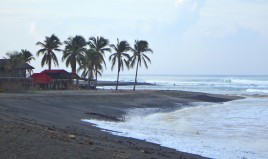
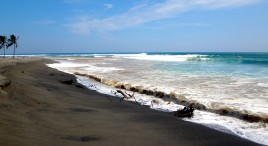
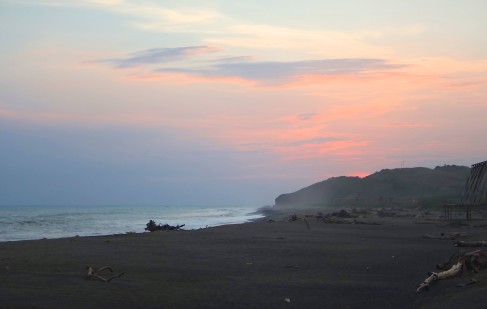
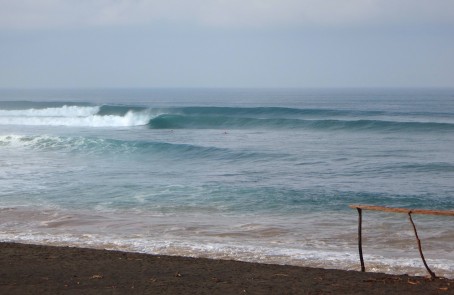
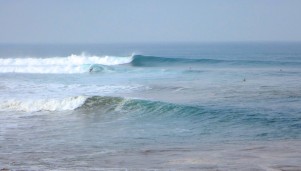
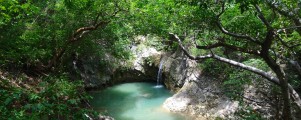

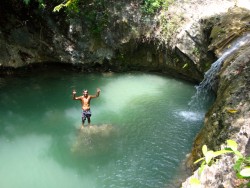
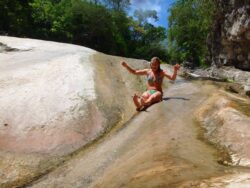
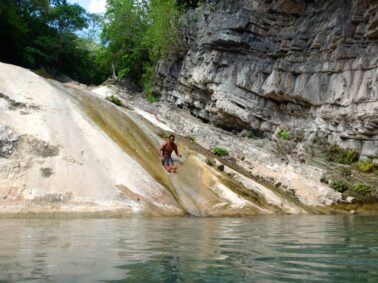
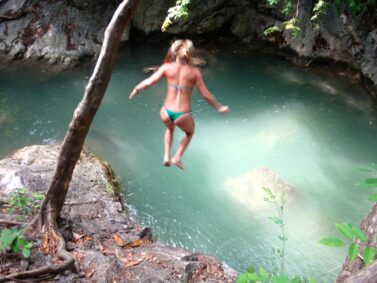

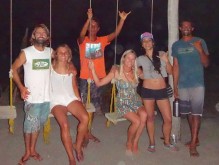
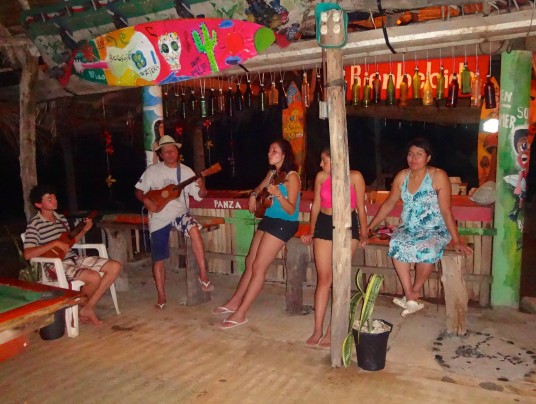
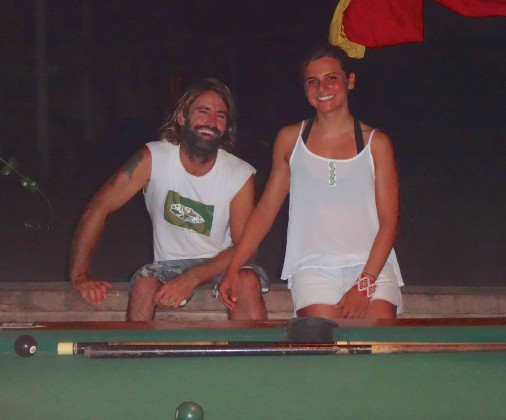

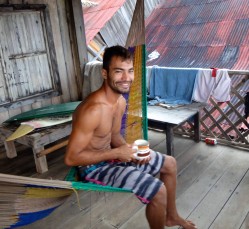
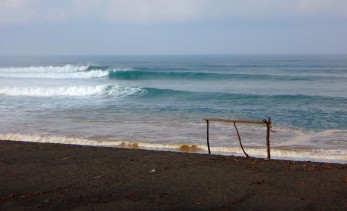
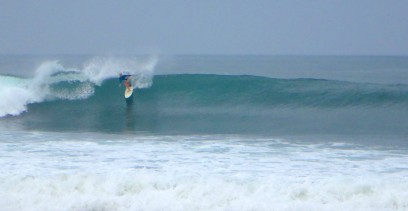
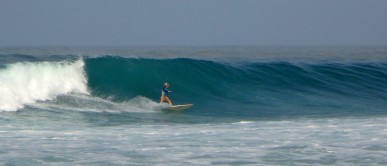
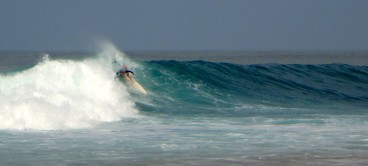
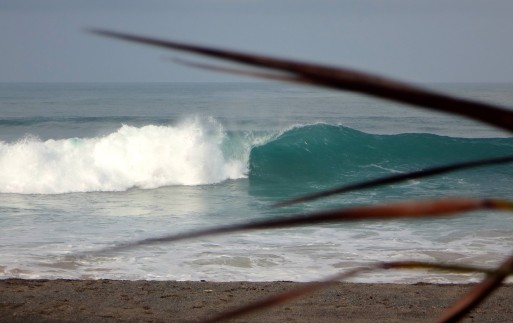
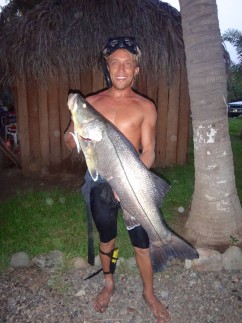
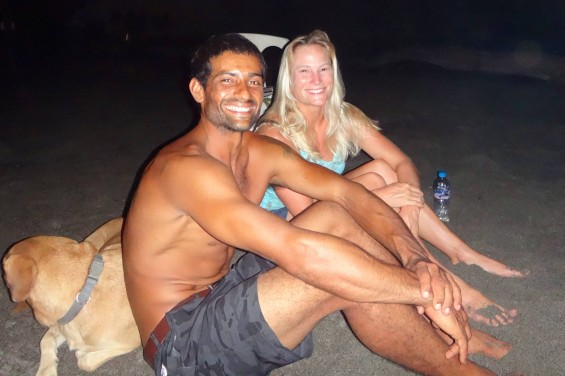

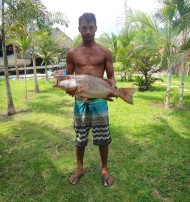

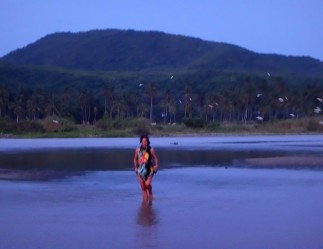
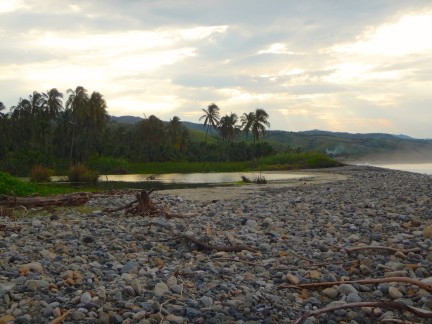

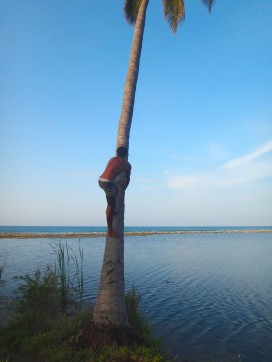
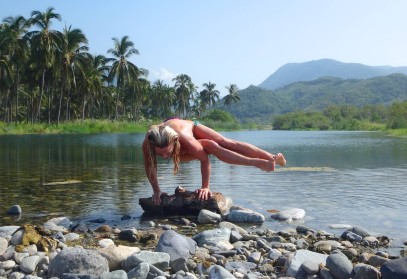

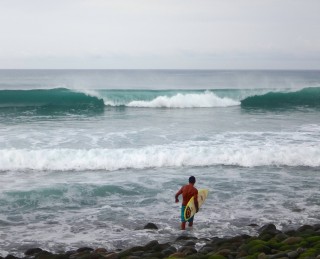
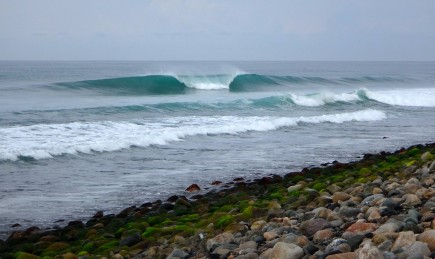
hey savila !! nice to meet you.. hope you to come to manzanillo and the Temazkalli .. youll love it !!! good waves !!
Wonderful story. Memorable pictures. Great waves. What an experience! Love, Jim H.
So beautiful!!! Just like you.Was beginning to worry a little because it seems ages since your last blog. I think it’s just that I love the blogs so much I miss them when they don’t come.
Really hope you write a book so many other people can appreciate your journey. Luvya sooo much. Nana